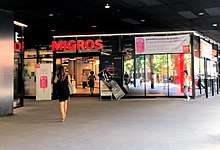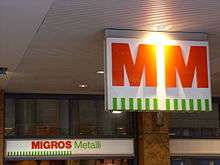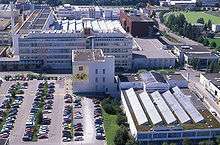Migros
Migros (German pronunciation: [ˈmiɡro]) is Switzerland's largest retail company, its largest supermarket chain and largest employer. It is also one of the forty largest retailers in the world. It is structured in the form of a cooperative federation (the Federation of Migros Cooperatives), with more than two million members.
 | |
Native name | (in German) Migros-Genossenschafts-Bund (in French) Fédération des coopératives Migros (in Italian) Federazione delle cooperative Migros |
|---|---|
| Cooperative | |
| Industry | Retail |
| Founded | 1925 |
| Founder | Gottlieb Duttweiler |
| Headquarters | , |
| Products | Supermarkets, food industry, petrol, electronics, books, home-wares, etc. |
| Revenue | 27.41 billion CHF (2015) |
| 791 million CHF (2015) | |
Number of employees | 100,373 (2015) |
| Website | www.migros.ch |
It co-founded Turkey's largest retailer, Migros Türk, which became independent of Migros Switzerland in 1975.
The name comes from the French "mi" for half or mid-way and "gros", which means wholesale. Thus the word connotes prices that are halfway between retail and wholesale. The logo of the company is a large orange M. Migros is often referred to as "der orange Riese",[1] i.e. "the orange giant" (German: oranger Riese, French: géant orange, Italian: gigante arancio), an expression presumably borrowed from Germany, where Deutsche Telekom is often referred to as "der rosa Riese",[2] i.e. "the pink giant"
History
Migros was founded in 1925 in Zürich as a private enterprise by Gottlieb Duttweiler, who had the idea of selling just six basic foodstuffs at low prices to householders who, in those days, did not have ready access to markets of any kind.[3] At first he sold only coffee, rice, sugar, pasta, coconut fat and soap from five lorries that went from one village or hamlet to another.[3] The strategy to cut the intermediate trade and their margins led to the broad resistance of his competitors who goaded the producers to boycott him. As a reaction to this threat, Migros started creating its own line of goods beginning with meat, milk and chocolate.
.jpg)
Later he and his drivers expanded their inventory and, in 1926, Gottlieb Duttweiler built his first market, also in Zürich. His second store, in Ticino, presaged the future as it was founded as a cooperative. By 1941, the energetic entrepreneur had built a number of markets but, in that year, he basically gave the business to his customers by transforming everything from his privately owned enterprises into regional cooperatives, headed by the Federation of Migros Cooperatives (German: Migros-Genossenschafts-Bund, French: Fédération des coopératives Migros, Italian: Federazione delle cooperative Migros).
As early as 1935, Duttweiler showed his zest for expansion by founding the Hotelplan travel agency. In 1942, the Migros brand was applied to a weekly magazine, Wir Brückenbauer (now known as Migros Magazin[4]). Other ventures were restaurants in 1952, gasoline stations (Migrol) in 1954, language schools (Eurocentres) in 1956, the Migros Bank in 1957 and an insurance company in 1959.
On behalf of the Migros Genossenschafts-Bund, the Zürich-based Reederei Zürich AG ordered at the H. C. Stülcken Sohn shipyard in Hamburg, Germany, the cargo ship Adele which was launched in Hamburg on 15 July 1952; the ship was christened by Adele Duttweiler, the wife of Gottlieb Duttweiler.[5]
In 1954, Migros entered the Turkish market, forming Migros Türk in partnership with the Istanbul City Council. This was sold to the Turkish conglomerate Koç Holding in 1975 and is the largest retailer in Turkey. Between 2008 and 2011, Koç Holding sold most of its shares of Migros Türk to BC Partners.
Migros opened its first foreign supermarket in the frontier region of France, in Thoiry, in 1993, and its first recreation park, Säntispark, at Abtwil in Saint Gallen, in 1986.
In 1995, Migros introduced its organic label "Migros Bio" (which Swiss products follow the Bio Suisse guidelines). In 2017, it added a specific label for organic products containing at least 90% of Swiss ingredients ("Migros Bio Suisse").
In October 2012, Migros expanded in the German market by acquiring the Hessian food store chain Tegut. In the same year, Migros opened the first Swiss store of German organic supermarket chain Alnatura.[6] In 2013, however, the company announced the sale, effective October 2013, to the REWE retailing group of its four Migros branded stores in Germany, which it had established in 1995 (Lörrach) and subsequently.[7]
In 2016, Migros announced that they will progressively stop distributing free plastic bags (at the check-out).[8] Migros previously tested the measure in the Canton of Vaud since 2013: they reduced the number of plastic bags distributed by ninety percent (and saved 100,000 francs per year).[8][9] Migros will be the first to introduce the measure across the country, on 1 November 2016 (the bags will be made with recycled plastic and cost 0.05 Swiss francs each).[8][9] They also announced that they will not make money with paid bags, but that profits from their sale will be invested in environmental projects.[10]
Philosophy
Gottlieb Duttweiler was concerned of the health of his customers and decided that Migros would not sell any alcoholic beverages nor any tobacco.[11] It is still the case today; although Denner, owned by the Migros group, does sell alcoholic beverages and cigarettes.
Here is a summary of some characteristics of Migros and its "responsible" philosophy:[12]
- Does not sell any alcoholic beverages nor any tobacco;
- Does not pay any dividend;
- If the earnings before interest and taxes (EBIT) reaches 5% of the market value of the company, the supermarkets have to lower their prices;
- Organised as a cooperative (federation of regional cooperatives), with more than two million shareholders;
- Every adult living in Switzerland can become a member (receive a share for free) and vote at the general assembly;
- Uses 0.5% of its revenue to social and cultural projects.
Adèle and Gottlieb Duttweiler also wrote their "fifteen theses" (1950) which, without being legally binding, are an ethical heritage of Migros. It contains values and guidance such as a goal of "serving the community", "The general principle that we profess is to place people at the center of the economy" and "The general interest will be placed higher than the interests of the Migros cooperatives".[13]

Migros today

To this day, Migros keeps the cooperative society as its form of organisation. Nowadays, a large part of the Swiss population are members of the Migros cooperative – around 2 million of Switzerland's total population of 7.2 million,[14][15] thus making Migros a supermarket chain that is owned by its customers. More than 90% of the assortment of goods is produced by ninety subsidiaries of Migros.
Reflecting the altruism of its founder, Migros operates a number of evening schools for working adults, featuring classes in cooking, languages and other subjects. It has obligated itself to spend one percent of its annual turnover for financing cultural projects in a broad sense; the sub-organisation taking care of this is called Migros Kulturprozent[16] ("cultural percent"). In 2011, an amount of 117 million Swiss francs was paid to finance this purpose. An example of the Kulturprozent's activity is its own record label Musiques Suisses often featuring little-known works from Swiss music history.
The supermarkets are categorized in the three size classes of M, MM and MMM. The firm's loyalty card is the M-cumulus card (a play on the word accumulate and a type of cloud formation).
Migros acquired some notoriety in 1977 when it fired its severest internal critic, Hans A. Pestalozzi.
M-Budget and Migros Sélection

In 1996, influenced by the budget ranges in supermarket chains in Australia,[17] Migros made their budget range called M-Budget with seventy products aimed at those with low incomes and large families. Now it has grown to 330 products including mountain bikes, snowboards, mp3 players, milk chocolate, jeans, shoes and lighters. M-Budget products have a standardized packaging color scheme, consisting of a grass green background with the Migros logo in small white text repeated over it.
Many of these products are produced in limited quantities rather than as an integral, permanent part of the Migros line. Whether they become permanent depends on their success. This, combined with the considerable brand recognition that Migros enjoys, conveys a certain amount of desirability to the rarer products. As a result, M-Budget items will sometimes be considered collectibles, as it is not always sure that they will ever be produced again.
To promote the range, in the early 2000s (decade), Migros developed M-Budget Party with tickets costing 9.90 CHF including free non-alcoholic drinks (cola, lemonade and orange juice) and snacks (crisps, chocolate and cakes).
In 2005, together with Swisscom, Migros launched M-Budget Mobile, a pay-as-you-go MVNO mobile virtual network operator.
Also in 2005, Migros introduced a premium line called Migros sélection, featuring for the most part food products typically associated with higher budgets and prepared in different fashions than is available through general stock. Sélection products also have their distinctive packaging, with pearl white and gold color schemes.
In April 2006, Migros announced the M-Budget credit card, an initiative between the Federation of Migros Cooperatives, GE Money Bank and MasterCard, originally with an annual rate of CHF 4.40, which is low compared to credit card annual rates of CHF 100 for a MigrosBank MasterCard Argent credit card. The card was ready by the autumn 2006. After Coop, the biggest competitor of Migros, announced a credit card without any annual rate, Migros scrapped its annual charge. Migros later announced the full details of the credit card, it will have an APR of 9.9% and the ability to gain cumulus points (1 point per 2 francs).
Companies

- Migros supermarkets
- Denner (bought 70% stake in 2007, became a completely-owned subsidiary in 2009)
- LeShop.ch: on-line supermarket (cooperation started in 2004, bought 80% stake in 2006)
- Migrol: petrol stations
- Migrolino: convenience stores
- M-electronics: electronics retail stores and internet music download service
- Obi: Do it yourself stores
- FitnessPark: fitness centres
- Do it+Garden: do-it-yourself stores and garden centres
- Micasa: furniture stores
- Migros Bank: bank (it is the fifth-largest in Switzerland)
- Golfpark: public golf courses
- Change Migros: currency exchange
- Ex Libris: bookshops
- Migros Klubschule (Migros Club Schools): adult education centres
- SportXX: sports shops
- Eurocentres: language schools
- Migros Magazin: the company's sales magazine
- Hotelplan: holidays company
- Florissimail: postal flower service
- Monte Generoso Railway: railway owned by Migros
- Glattzentrum: shopping mall near Zurich
- Digitec Galaxus: consumer electronics and telecommunication shops, household, DIY, garden and sports equipment, and online shop
M-Industry
A large part of the products sold in the Migros supermarkets are produced by its own companies (M-Industry), mostly in Switzerland.[18] In 2017, M-Industry comprises 32 companies, 25 of which are in Switzerland, and produce more than 20,000 products for the Migros supermarkets.[18][19]
M-Industry companies include:
- Aproz: mineral waters, fruit drinks, fruit juices
- Bischofszell: ice tea, fruit juices, convenience food, crips, jams
- Delica: coffees, dried fruits, nuts, spices
- Estavayer Lait SA (ELSA): milk, yogurts
- Frey: chocolate, chewing gums
- Jowa: breads, pastries
- La Risiera: rices
- Mibelle: cosmetic products, dietary fat
- Micarna: meat and fish
- Midor: biscuits and ice creams
- Mifroma: Raccard, Gruyère, Appenzeller and fondue cheeses
M-Industry products are exported to fifty countries, including China (under the name Orange Garten, Chinese: 欧瑞家; pinyin: Ōuruìjiā).[19]
Globus group (formerly owned by Migros)
Globus Group became part of Migros in 1997, but was sold to Signa Holding and Central Group in 2020.[20]
- Interio: furniture stores
- Globus: top-of-the-range department stores
- Globus Herren: menswear stores
- Office World: office supplies (not the British Office Worlds, owned by Staples)
- Globi: a cartoon character who is mascot of the Globus Group, often referred to as Switzerland's Mickey Mouse.
Subito
After some time, as their main competitor Coop, Migros also followed the idea of self-service checkout.[21]
Competitors
Migros's main competitor, Coop (Switzerland's second-largest supermarket chain), also has a cooperative structure like Migros, but with a more centralized organization.[22] Smaller competitors include the Manor department-store chain, and more recently Aldi. Aldi, a very large supermarket group internationally, opened its first Swiss shops in 2005, and thus operates just a few branches as of 2015. A further competitor, Lidl, established its first Swiss supermarkets in March 2009.[23]
In January 2007 Migros acquired 70 per cent Denner's shares, effectively merging the largest and third-largest food retail chains in Switzerland. According to both companies, the move took place in order for the Denner chain to better compete with increasing foreign competition.[24]
Criticism
Some critics like Sorgim, a Swiss non-profit organization (its name is Migros backwards), claim that Migros has lost touch with its founder's ideals. They say that the cooperative is not governed democratically by its members as it was once envisioned by Gottlieb Duttweiler. It is argued that instead, through various amendments to the by-laws, it is now the executive board that decides over all major business matters and policies.[25]
See also
Notes and references
- "Migros - der orange Riese" [Migros - the orange giant]. Handelsblatt (in German). Retrieved 6 February 2019.
- "Deutsche Telekom: Rosa Riese 4.0 - die Zukunft kann kommen!". Der Aktionär (in German). 8 September 2015. Retrieved 6 February 2019.
- (in French) "Huile de coco. Un produit des origines", Migros magazine, number 35, 29 August 2016, page 55.
- Names of the French editions are Pionnier Migros (1944-1947), Construire (1947-2004) and Migros magazine (since 2004).
- "Euses Schiff" (PDF) (in German). Brückenbauer. 25 July 1952. Retrieved 10 October 2015.
- Migros begins major offensive in organic market. Archived 4 March 2016 at the Wayback Machine Fresh Plaza, 13 September 2013
- Migros schließt Filialen in Freiburg und Lörrach
- (in French) Michel Guillaume, "L'économie suisse promet de verdir", Le temps, Monday 26 September 2016, page 4. Published on-line as "L'économie suisse promet de verdir malgré le rejet de l'initiative" on 25 September 2016 (page visited on 26 September 2016).
- (in French) Michael West, "Environnement. 'Petits prix pour grands effets'", Migros magazine, number 39, 29 September 2016, page 38-39.
- (in French) "Chez Coop et Migros, les sacs jetables vont désormais coûter 5 centimes", Radio télévision suisse, 22 September 2016 (page visited on 25 September 2016).
- (in French) "Migros, c'est d'abord une idée", official website of Migros (page visited on 25 January 2016).
- "L'exception Migros" [The Migros Exception]. Migros Magazine (in French). 25 January 2016. Retrieved 11 October 2019.
- (in French) Migros, les quinze thèses, Migros (page visited on 3 February 2016).
- Article by Thomas Hammer in German newspaper Die Zeit (in German)
- Article by Constantin Seibt in Swiss newspaper WOZ Archived 30 September 2007 at the Wayback Machine (in German)
- Official site of Migros Kulturprozent (in German, French, and Italian)
- Produits M-Budget: l'histoire d'un succès Archived 7 September 2007 at the Wayback Machine, on the Migros website. Retrieved 16 August 2007.
- M-Industry (page visited on 22 December 2017).
- (in French) Ram Etwareea, "En s'implantant dans le commerce en ligne en Chine, Migros cible un marché géant", Le Temps, 22 December 2017 (page visited on 22 December 2017).
- "Central, Signa ink deal for Globus chain". Bangkok Post. Retrieved 12 April 2020.
- "Migros lässt den Kunden scannen" (PDF). Archived from the original (PDF) on 4 March 2016. Retrieved 5 August 2015.
- Article "Coop (Schweiz)" in German Wikipedia
- Torsten Riecke (18 March 2009). "Lidl eröffnet ersten Laden in der Schweiz" [Lidl opens first shop in Switzerland]. Handelsblatt (in German). Retrieved 30 September 2009.
- Switzerland's largest retailer, Migros, has purchased a majority stake in the country's third largest food chain, Denner. from Swissinfo
- "SORGIM die unabhängige MIGROS Plattform". Archived from the original on 1 December 2017. Retrieved 28 August 2015.
External links
| Wikimedia Commons has media related to Migros. |
